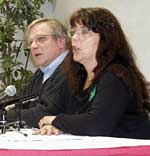It's back to work for 23,000 state employees
By Laura McCallum
Minnesota Public Radio
October 15, 2001 Thousands of Minnesota state employees went back to work Monday, ending the state's largest strike. Negotiators for the state and its two largest employee unions reached a tentative settlement over the weekend, although rank-and-file union members must still ratify the contract. While some workers aren't happy with the agreement, a new poll shows more Minnesotans agree with Gov. Ventura's hold-the-line stance on the strike than with the unions.
| |
|
|
|
||
Still, some union members don't like the deal. Gloria Edwards, an AFSCME member who works for Capitol security, says she thinks workers should still be on the picket line, and she won't vote for the contract. "I don't think it was worth the time that we spent out there. I really think we should still be there. I think that they could've offered more than that," she said.
Union leaders are recommending members ratify the contract, and will explain the details at informational meetings around the state. Voting should be completed in the next month. In the meantime, employees who were on strike for two weeks find themselves working side-by-side with co-workers who crossed the picket line.
Administration Commissioner David Fisher says although no confrontations have been reported, managers are going through training to handle the inevitable tension in the workplace. "We're back to work, and we need to focus on our workplan. And we're doing a bit of stress management counseling as well, so that people know that we're supportive of the stress of all the employees," Fisher said.
Fisher says all state offices should now be open for business again, although the public may experience delays as returning workers try to deal with a two-week backlog.
| |
|
|
|
||
At the time, the state's final offer was a 3-percent pay raise in each of the next two years for AFSCME workers, and a one-time 4-percent raise for MAPE members. Half of those polled supported Ventura's position that the offer was fair, while 31 percent agreed with state workers that the state could afford to pay more than it was offering. 19 percent were undecided.
"This is consistent with the governor's feeling that it was a fair offer, and apparently the people are agreeing," said Ventura spokesman John Wodele.
The poll also asked respondents to rate Ventura's performance managing the negotiations and the state during the strike. Thirty-six percent considered his performance good or excellent, 25 percent ranked it fair, and 23 percent described his performance as poor.
MAPE Executive Director Jim Monroe says a significant number of Minnesotans agree with union members who question Ventura's involvement in the contract talks and some of his comments during the strike. "He clearly burned some bridges with the workforce that are not going to be rebuilt. He was pretty popular with the state workers when he did his early tours to the agencies, and I seriously doubt the remainder of this term of office, he's going to have the kind of reception from the workers," Monroe said.
Ventura said in a statement that state agencies will pay for the contract with budget cuts, and if necessary, layoffs.


